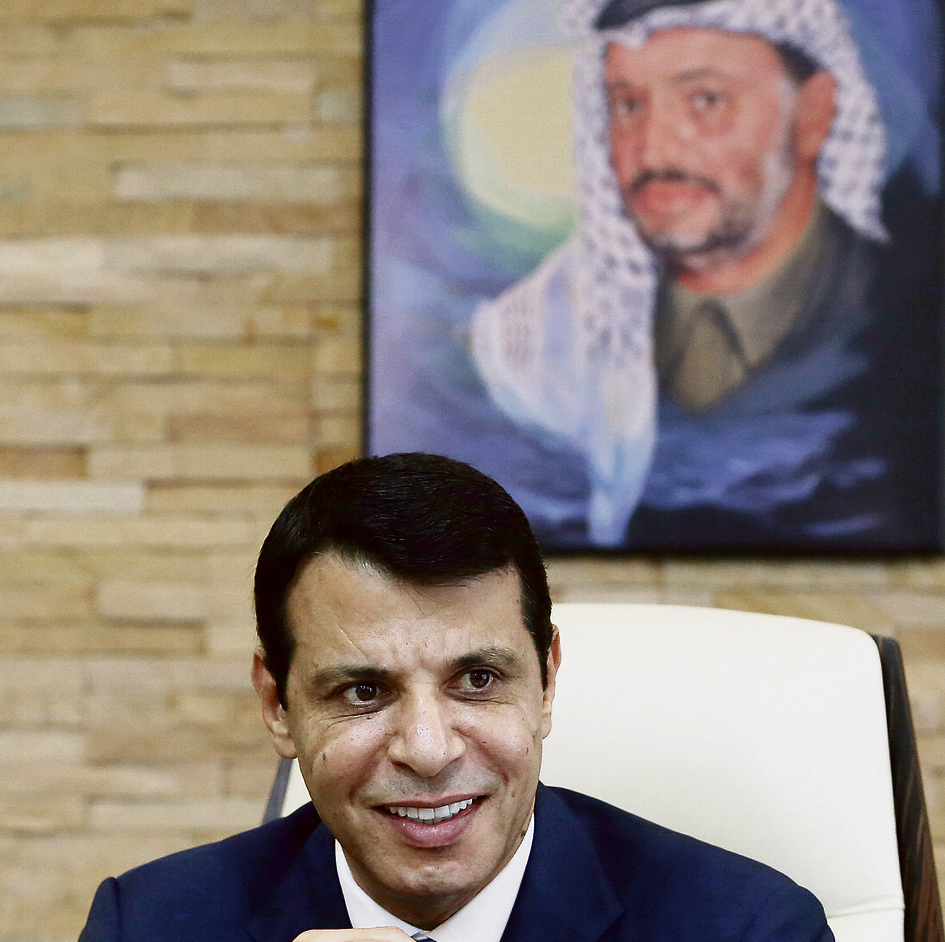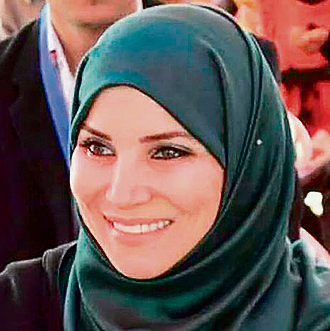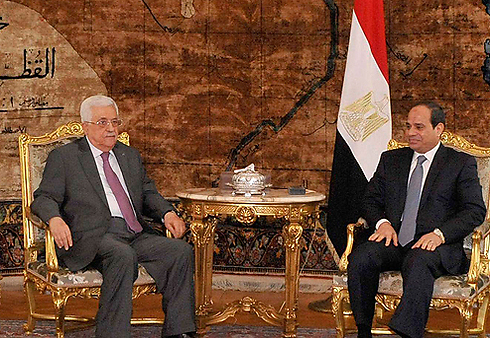
Mohammad Dahlan’s plan to take over Gaza—and Ramallah
Ten years after leaving Gaza, the former head of the Palestinian Preventive Security Force may return to the strip a leader, as part of a move being devised by Egypt, Saudi Arabia, the UAE, Bahrain, the US and Israel. The plan, an Israeli expert says, is Dahlan’s dress rehearsal, as he strives to conquer the Muqata’a and take Abbas’s seat.
The leaders involved in the plan include Egyptian President Abdel Fattah al-Sisi and his intelligence chief Khaled Fawzy, as well as the Saudi king and crown prince, the ruler of the United Arab Emirates in the Persian Gulf and his deputy, the king of Bahrain, Prime Minister Benjamin Netanyahu and Defense Minister Avigdor Lieberman, and US President Donald Trump. Nevertheless, it may collapse at any moment. It’s quite convenient for everyone, at this stage, that the attention has been diverted from Gaza to the mosque, which is sacred to a billion and a half Muslims.
“The plan of the century” would be carried out in 10 stages. Hamas’s leader in Gaza, Yahya Sanwar, was summoned in the first week of June with four of his close assistants to a marathon of meetings at the Egyptian intelligence headquarters in Cairo. On the second day, Mohammad Dahlan showed up. After 10 years of estrangement, the childhood friends from the Khan Younis refugee camp met at the intelligence headquarters in Cairo.

Dahlan presented the first stage in the “plan of the century”: The Palestinian side of the Rafah Border Crossing would be manned by 100 Fatah people in the Gaza Strip and young Dahlan loyalists. If the list of names would be approved by Hamas and the military wings, the new border policemen would undergo quick training sessions at an Egyptian police base. Immediately after the roadblocks would be manned, Egypt would open Rafah, allowing the strip’s two million residents free, permanent passage, independent of political crises. Students with scholarships would be able to fulfill their dreams, families and young couples would be united, those who can afford it would be able to travel in the world, investors and contractors would arrive, and Gaza would begin to “breathe free air.”
It’s no coincidence that, about four months ago, Transportation Minister Yisrael Katz presented the American representative with his plan, which is incorporated into “the plan of the century,” to build a seaport on a man-made island opposite Gaza and allow fishing vessels freedom of navigation.
Dahlan explained to the Hamas leadership that it must reach a dialogue with Israel, through him. He used the opportunity to inquire about a prisoner swap deal as well: Israel would release prisoners and Hamas would return the bodies of two IDF soldiers who were killed in Operation Protective Edge, Oron Shaul and Hadar Goldin, as well as three citizens who crossed the border into Gaza—Avera Mengistu, Hisham al-Sayed and Juma Abu Anima.
When his efforts to reach a deal were uncovered, Dahlan was hit by a wave of criticism—mainly in Ramallah, Qatar and Turkey—and labeled “a Mossad agent.” Once again, his rivals pulled out stories from the past about his alleged involvement in poisoning Yasser Arafat and in providing intelligence for the alleged Israeli assassination of Mahmoud al-Mabhouh in Dubai.
Sanwar and his associates didn’t show any enthusiasm towards Dahlan’s plans. On the contrary, they presented a high price for the deal and began spreading rumors last week that the Hamas leadership was looking into the option of moving to Algeria. From the propaganda side, Algeria is identified with a war of freedom against the French occupation. On the less convenient side, Algeria is far away from where everything is happening, and Ismail Haniyeh wouldn’t dream of taking his family and seeking protection from elderly President Abdelaziz Bouteflika.
Follow the foundation
Dahlan is now pushing for the implementation of the next stage of “the plan of the century”—returning his right-hand man and close assistant, Samir Masharawi, to Gaza. At the Masharawi home in “Gaza Square,” which was deserted exactly 10 years ago, when Dahlan and his group fled the strip, renovation has just ended ahead of its repopulation. Thousands arrived last week to protest outside the house, waving green Hamas flags in a sort of dress rehearsal ahead of Masharawi’s expected return. The house is ready, but the return to Gaza was postponed following the serious terror attack against Egyptian army soldiers in northern Sinai about three weeks ago. If and when he returns, he will be greeted by thousands—with the Hamas leadership’s approval—on the Palestinian side of the Rafah Crossing, and they will accompany him to the alleys surrounding “Gaza square.”
Dahlan, 55, is proceeding with caution. Although he hasn’t announced his return yet, anyone looking for his fingerprints in Gaza should follow the Jalila Foundation, named after his wife. Tens of millions of dollars, donated by the UAE and its leader, Sheikh Khalifa bin Zayed, Dahlan’s patron, are flowing into the strip through the foundation, funding the establishment of a hospital, treatments in hundreds of cases of fertility problems among men and women, donations of prosthetic eyes and limb prostheses, and providing regular monthly financial aid to hundreds of underprivileged families and orphans in Gaza’s refugee camps. Since 2015, the foundation has also been funding a mass wedding held in Khan Younis every year on the eve of the Ramadan fast for 400 Palestinian brides and grooms.

Jalila, who is also known as Umm Fadi after their eldest son, has a PhD in psychology and is also responsible for funding treatments for traumatized children and adults in the strip.
Hamas’s security apparatus in the strip are troubled by her charity fund, as it contradicts the corruption at the top which has taken over donations and has helped boost the couple’s popularity in Gaza’s alleys and on campuses. Unlike Dahlan, who hasn’t returned to Gaza since his humiliating expulsion, Jalila makes sure to visit—with Hamas’s approval—and pose for photographs as she inaugurates projects and hands out funds.
Israeli experts have been closely monitoring Dahlan’s plan. “There’s no doubt he keeps doing his homework, living and breathing Gaza, but it’s unclear whether he has an immediate interest in leaving his good life in Abu Dhabi,” says an Israeli expert. In the rich emirate, he serves as the senior and close advisor on security and intelligence affair to the emir and his brother, the crown prince.
From Abu Dhabi, encouraged by the Saudi royal family which wishes to erase Qatar’s foothold in the strip, Dahlan has promised to get an additional $20 million for Gaza’s rehabilitation. “It’s a tiny sum compared to the billion dollars the emirate of Qatar has promised to invest in Gaza since Operation Protective Edge,” says the Israeli expert. But the donations from Qatar could be halted following the boycott against the emirate and the crisis in the Gulf.
The “plan of the century” corresponds with the crisis in the Gulf between Qatar and Saudi Arabia, Bahrain, the UAE and Egypt. Those with sharp eyes might have noticed that the Hamas movement in Gaza was excluded from the list of 59 wanted people and 12 terror organizations Qatar is accused of funding. It’s no coincidence. The Muslim Brotherhood movement, Hamas’s spiritual father, is at a top spot on the terror list. Hamas and its military wings, however, is nowhere to be found, likely due to Egyptian pressure to leave the door open for a dialogue with the Gaza leadership and prepare the ground for Dahlan.
Whether he returns to the strip or manages his activity there from a distance through his loyalists, Dahlan needs the local leadership’s cooperation. That’s another reason why another delegation of the strip’s militant wings left for the intelligence headquarters in Cairo in the middle of last week. The Egyptian intelligence would like to enlist them to implement the move too.
An Israeli embassy in Riyadh
“Broadly speaking,” the Israeli expert says, “Gaza is Dahlan’s dress rehearsal, as he strives to conquer the Muqata’a in Ramallah and take Abu Mazen’s (Mahmoud Abbas’s) seat.” Abbas, on his part, is aware of the plan. “Abu Mazen despises Dahlan so deeply and emotionally,” the expert adds, “that he’ll do everything in his power to block him. He believes Dahlan is teaming up with Hamas just to bring him down.”
The two began quarrelling after Dahlan served as Abbas’ security advisor. The love affair quickly faded, and Abbas, who had already developed suspicions and deep resentment, ordered the confiscation of Dahlan’s property, cancelled his membership in the Palestinian Authority leadership’s institutions and made him leave.
The legal claim Dahlan filed against Abbas, through Israeli lawyer Zaki Kamal, didn’t help calm things down either. According to one of Dahlan’s associates, Abbas ordered his people to harass Abu Fadi’s loyalists as well and “destroy the camp.” Dahlan, in response, enlisted Muhammad Rashid, Arafat’s mysterious money man, and acquired the position of al-Sisi’s advisor in the Ittihadiya Palace in Cairo.
“As far as al-Sisi is concerned,” the Israeli expert explains, “there’s no particular affection here for the charismatic Dahlan. Al-Sisi, who served as head of the Egyptian military intelligence, knows the ‘Dahlan case’ by heart. He sees him as a tool connecting the money that arrives from the Gulf emirates with the Egyptian interest to get rid of Qatar and achieve peace in Gaza. in the Egyptian intelligence’s list of priorities, a calm strip is a precondition for a successful war on terror in Sinai.”

Even the transfer of Egyptian sovereignty over the islands of Tiran and Sanafir along the Suez Canal to Saudi Arabia has to do with the “plan of the century.” The parliament in Cairo opposed the transfer, jurists spoke up against it, the Egyptian street threatened protests and the media responded with poisonous articles, but al-Sisi insisted and managed to gain the required majority.
This isn’t just about tightening relations and the Saudi economic aid that Egypt has been promised. Saudi Arabia kept silent last week over the terror attack at the Al-Aqsa compound. A senior commentator in Riyadh made sure to remind everyone that metal detectors had been installed at the entrance to Mecca’s holy sites and that “the world didn’t collapse.” Another Saudi commentator saw it fit to recommend, in the middle of the stormy days, that “Saudi Arabia should seriously consider opening an embassy in Israel.” Not only wasn’t the commentator, Mohammad al-Anazi, punished—he was even quoted as the Saudi crown prince’s mouthpiece, on television channels as well.
If Dahlan returns to Gaza, and if the opening of the crossings—alongside an ease of restrictions from the Israeli side—goes as planned, he will strive to become the strip’s prime minister or foreign minister, or hold both positions. His job will be to ensure zero failures and weapon smugglings from the strip to Sinai, and vice versa. The big challenge will focus on expanding the strip’s territory towards Sinai, a very promising idea which depends on the Egyptian cooperation.
“The shrewd Dahlan is playing a sophisticated game,” says the Israeli expert. “When Abbas blocks his way into Ramallah, he works on the postern, through the strip. He is definitely preparing himself, maximizing all his advantages and acting like a racing horse that knows where the goal line is.”
In a meeting in Egypt, Abbas complained to al-Sisi about the plot being devised behind his back. The Egyptian president made sure to release positive statements, but people in the close circle know there is no love lost between the two. Al-Sisi is furious at Abbas for turning down the reconciliation plan with Hamas and choosing to punish Gaza. The government workers’s salary cuts and the refusal to pay the strip’s electricity bills create a dangerous level of pressure on Egypt. Al-Sisi also tried to convince Abbas to reconcile with Dahlan, but there was no one to talk to. He is thinking about the day after as well, and he is angry at 82-year-old Abbas for refusing to appoint a successor.
“In surveys conducted both in the strip and in Ramallah over who should be Gaza’s leader, the winner was Ismail Haniyeh, followed by Dahlan,” the Israeli expert says. “Abu Mazen and Barghouti are far behind, and it’s driving Abu Mazen wild. In a protest held this week, people raised signs reading ‘Abu Mazen doesn’t represent me’ and ‘Bring Abu Fadi.’ Abbas’s hatred towards Dahlan makes absolutely no sense. Dahlan sent emissaries over, but Abu Mazen kicked them out. He would rather get into a quarrel with Egypt and the UAE, as long as he doesn’t have to see Dahlan’s face next to him.”
If Abbas suddenly disappears, it’s unclear who will replace him. If Saeb Erekat had any plans, they will have to be shelved due to his serious illness and planned lung transplantation. Jibril Rajoub, who is quietly expanding his camp, is not part of Abbas’s inner circle and is not seen favorably in Cairo, Amman and Jerusalem.
Storming the Muqata’a is the final stage in Dahlan’s “plan of the century.” In the meantime, he is on schedule but far from the finish line. Without the help of the coalition behind him, Dahlan may found Majed Faraj—the intelligence chief in Ramallah—or another figure on the seat, without Gaza, and the dream of the united Palestinian state will keep fading away. If that happens, Dahlan is expected to pull out the plan’s secret weapon: He will announce that he is disconnecting Gaza and declare himself the strip’s leader.










